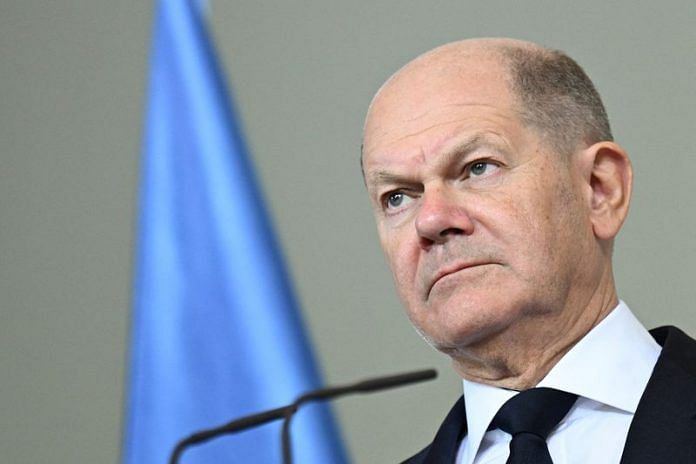By Sarah Marsh and Andreas Rinke
BERLIN (Reuters) -Donald Trump’s return as U.S. president increases the need for a German government that is able to act decisively, officials said, ahead of a meeting on Wednesday evening that may determine the fate of Chancellor Olaf Scholz’s faltering coalition.
Relations between Scholz’s centre-left Social Democrats (SPD), the Greens and free-market Free Democrats (FDP) have sunk to new lows over the past week as they clashed over their differing visions on how to rescue the economy from decline.
Scholz, Finance Minister Christian Lindner of the FDP and Economy Minister Robert Habeck of the Greens have held a string of crisis meetings in recent days on how to plug a multi-billion-dollar hole in the budget and forge a compromise on economic policies.
They will present their proposals at a broader gathering of parliamentary and party leaders from the three camps at 6 p.m. (1700 GMT) that could stretch into the night. Should the talks fail, the coalition could fall apart.
“Everything is on the table,” SPD General Secretary Matthias Miersch told Reuters. “Everyone knows what’s at stake and that’s why I’m really expecting today to be the day of the decision.”
Miersch said he expected everyone within the coalition to take their responsibilities seriously and find a solution.
The return of Trump, whose isolationist and “America First” policies are widely seen as potentially damaging for Europe’s economy and security, only bolsters the need for a decisive government in the bloc’s main power, officials said.
“The only consequence of this U.S. election result must be that Germany cannot be absent from Europe,” Habeck said.
Germany was a frequent focus of Trump’s ire during his 2017-21 term as president due to its trade surplus with the United States and low spending on defence.
“We are facing uncertain times,” Andreas Audretsch, deputy parliamentary group leader of the Greens, told Reuters. “It would be negligent not to find a solution for the next budget – we owe this to the people and companies in Germany, but also to Europe as a whole.”
But opposition lawmakers such as the conservatives’ Jens Spahn argued that, on the contrary, new elections were necessary because he said Scholz’s coalition would be unable to negotiate on an equal footing with Trump.
NEW ELECTIONS?
A coalition collapse could leave Scholz heading a minority government and relying on ad hoc parliamentary majorities to govern, or else trigger an early election – which surveys suggest would be disastrous for all three coalition parties.
The SPD and Greens are polling well below their scores in the 2021 election, while the FDP could be ejected from parliament altogether.
The three parties are at odds over how best to rescue Europe’s largest economy, which is now facing its second year of contraction and a crisis in its business model after the end of cheap Russian gas and amid increasing competition from China.
The FDP has proposed public spending cuts, lower taxes and less regulation as the answer to this malaise. It also wants to slow down Germany’s shift to a carbon-neutral economy.
The SPD and the Greens meanwhile, while at odds on a host of other issues, agree that targeted government spending is needed.
Still, Habeck made a major concession towards the FDP on Monday, saying the funds earmarked as subsidies for a new Intel chip factory could now be used to plug the hole in the budget.
(Reporting by Sarah Marsh, Andreas Rinke, Christian Kraemer and Riham AlkousaaEditing by Mark Heinrich, Matthias Williams and Gareth Jones)
Disclaimer: This report is auto generated from the Reuters news service. ThePrint holds no responsibilty for its content.






